 W
WAdam Abell was a Scottish Friar at Jedburgh Abbey. He wrote a chronicle in the 1530s that gives an insight into contemporary thought and contains anecdotes that appear in later writings. The manuscript of the Roit or Quheil of Tyme is kept at the National Library of Scotland, Ms. 1746. It was donated by Lt.-Colonel W. W. Cunninghame of Caprington.
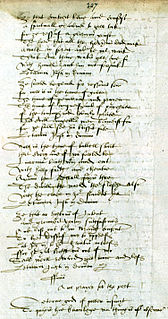 W
WGeorge Bannatyne (1545–1608), a native of Angus, Scotland, was an Edinburgh merchant and burgess. He was the seventh of twenty-three children, including Catherine Bannatyne, born of James Bannatyne of Kirktown of Newtyle in Forfarshire and Katherine Tailefer. He is most famous as a collector of Scottish poems. He compiled an anthology of Scots poetry while in isolation during a plague in 1568. His work extended to eight hundred folio pages, divided into five parts. The anthology includes works from Scottish Chaucerians as well as many anonymous writers.
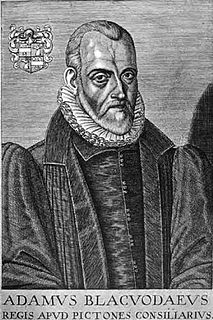 W
WAdam Blackwood (1539–1613) was a Scottish author and apologist for Mary, Queen of Scots.
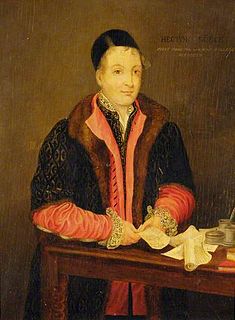 W
WHector Boece, known in Latin as Hector Boecius or Boethius, was a Scottish philosopher and historian, and the first Principal of King's College in Aberdeen, a predecessor of the University of Aberdeen.
 W
WGeorge Buchanan was a Scottish historian and humanist scholar. According to historian Keith Brown, Buchanan was "the most profound intellectual sixteenth century Scotland produced." His ideology of resistance to royal usurpation gained widespread acceptance during the Scottish Reformation. Brown says the ease with which King James VII was deposed in 1689 shows the power of Buchananite ideas.
 W
WJohn Craig was a Reformer, and colleague of John Knox. Originally a Dominican, he became a Church of Scotland minister with significant extra responsibilities and played an influential part in the Scottish Reformation.
 W
WJohn Davidson was born about the year 1549 at Dunfermline, where his parents owned property in houses and lands. He entered St Leonard's College, St Andrews, in 1567, and after graduating, became a regent of the college, pursuing the study of theology. Being introduced to John Knox, he set himself to advance the cause of the Reformation, and one of his earliest services was the production of a play intended to expose the errors of Romanism, which was acted in Knox's presence. In 1573 there appeared from his pen Ane Breif Commendation of Uprightness, a poem in praise of Knox, with accompanying verses on the Reformer's death. Soon after, another poetical tract was issued anonymously, under the title of Ane Dialog, or Mutitait Talking betwixt a Clerk and ane Courteour, concerning foure Parische Kirks till ane Minister. This was a reflection on the Regent Morton, who had been uniting parishes under one minister to secure part of the benefices for himself. The Regent was deeply offended. Printer and poet were put in prison. On his liberation, he lay hid for a time at Kinzeaneleugh, Ayrshire, the residence of his friend Robert Campbell. He then retired to the Continent, where he remained for about three years. In 1577, at the urgent solicitation of the General Assembly, Morton permitted his return, and in 1579 he became minister of Liberton. In June 1581, Morton being under sentence of death was visited by Davidson. Going for a time to London, he became known at the English Court, and from the earnest style of his preaching was called the thunderer. Returning, he did not resume his charge at Liberton, but officiated in various places. and acted as minister of the Second Charge of Holyrood. In 1595 he became minister Prestonpans, and built a church and manse at his own expense. He vigorously resented the proposal that certain of the clergy should sit and vote in Parliament, and words that he then uttered were often repeated : "Busk him, busk him as bonnily as ye can, and bring him in as fairly as ye will, we see him well eneuch, we see the horns of his mitre." He was summoned before King James at Holyrood, and committed to Edinburgh Castle, but released, and allowed to return home, though interdicted from going beyond the bounds of his parish. He died in September 1604.
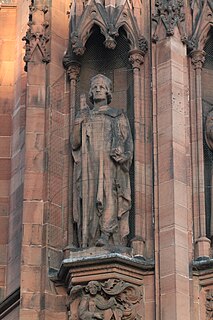 W
WGavin Douglas was a Scottish bishop, makar and translator. Although he had an important political career, he is chiefly remembered for his poetry. His main pioneering achievement was the Eneados, a full and faithful vernacular translation of the Aeneid of Virgil into Scots, and the first successful example of its kind in any Anglic language. Other extant poetry of his includes Palice of Honour, and possibly King Hart.
 W
WWilliam Dunbar was a Scottish makar poet active in the late fifteenth century and the early sixteenth century. He was closely associated with the court of King James IV and produced a large body of work in Scots distinguished by its great variation in themes and literary styles. He was likely a native of East Lothian, as assumed from a satirical reference in The Flyting of Dumbar and Kennedie. His surname is also spelt Dumbar.
 W
WJames VI and I was King of Scotland as James VI from 24 July 1567 and King of England and Ireland as James I from the union of the Scottish and English crowns on 24 March 1603 until his death in 1625. The kingdoms of Scotland and England were individual sovereign states, with their own parliaments, judiciaries, and laws, though both were ruled by James in personal union.
 W
WWalter Kennedy, younger brother of John Kennedy, 2nd Lord Kennedy of Dunure. Clan Kennedy. He was parson of Douglas who acquired Glentig in 1504 from John Wallace, and married Christian Hynd.
 W
WJohn Knox was a Scottish minister, theologian, and writer who was a leader of the country's Reformation. He was the founder of the Presbyterian Church of Scotland.
 W
WJames Lawson was the Church of Scotland minister who succeeded John Knox at St Giles' Cathedral in Edinburgh. Lawson's great educational achievement was the founding of the University of Edinburgh. He may be said to have been its principal promoter, and its best and wisest friend during the first year of its history, 1583.
 W
WSir David Lyndsay of the Mount was a Scottish herald who gained the highest heraldic office of Lyon King of Arms. He remains a well regarded poet whose works reflect the spirit of the Renaissance, specifically as a makar.
 W
WMary Maitland was a Scottish writer believed to be the transcriber of the Quarto Volume of the Maitland Manuscripts, an important source for the Scots literature of the Fifteenth and Sixteenth Centuries. She recorded and preserved her father's extensive writings as his sight became increasingly poor, eventually resulting in his blindness.
 W
WDonald Monro was a Scottish clergyman, who wrote an early and historically valuable description of the Hebrides and other Scottish islands and enjoyed the honorific title of "Dean of the Isles".
 W
WAlexander Montgomerie was a Scottish Jacobean courtier and poet, or makar, born in Ayrshire. He was one of the principal members of the Castalian Band, a circle of poets in the court of James VI in the 1580s which included the king himself. Montgomerie was for a time in favour as one of the king's "favourites". He was a Catholic in a largely Protestant court and his involvement in political controversy led to his expulsion as an outlaw in the mid-1590s.
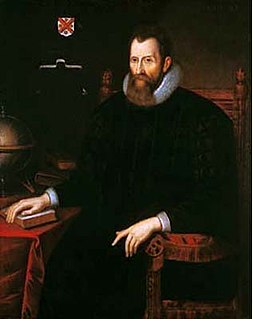 W
WJohn Napier of Merchiston, nicknamed Marvellous Merchiston, was a Scottish landowner known as a mathematician, physicist, and astronomer. He was the 8th Laird of Merchiston. His Latinized name was Ioannes Neper.
 W
WJohn Welsh was a Scottish Presbyterian leader. He was born in Dumfriesshire and attended the University of Edinburgh to obtain his MA in 1588. He became a minister in Selkirk and married Elizabeth Knox, a daughter of John and Margaret Knox, before leaving Selkirk. Welsh later ministered at Kirkcudbright and Ayr, the latter of which was where he spent five years. His preaching resulted in his imprisonment by the order of King James VI of Scotland. The lawyer Thomas Hamilton wrote to James VI about Welsh, John Forbes, and others; the case was important because many Scottish subjects of James were devoted to the ministers. In 1606 Welsh was exiled to France, where he continued to preach. John Welsh of Ayr was the father of Josias Welsh and the grandfather of John Welsh of Irongray.